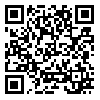Tue, Feb 3, 2026
Volume 35, Issue 3 (6-2025)
JHNM 2025, 35(3): 208-216 |
Back to browse issues page
Download citation:
BibTeX | RIS | EndNote | Medlars | ProCite | Reference Manager | RefWorks
Send citation to:



BibTeX | RIS | EndNote | Medlars | ProCite | Reference Manager | RefWorks
Send citation to:
Joseph J, Sequira L, christabel S. Knowledge, Symptoms, Quality of Life, and Health-seeking Behavior in Menopausal Nuns. JHNM 2025; 35 (3) :208-216
URL: http://hnmj.gums.ac.ir/article-1-2129-en.html
URL: http://hnmj.gums.ac.ir/article-1-2129-en.html
1- Nursing (MSc), M.Phil. (Nursing), MBAHCS. Vice Principal, Thiruhrudaya College of Nursing, Kerala, India.
2- Associate Professor, Manipal College of Nursing, Manipal Academy of Higher Education, Manipal, India. ,cliffleena@gmail.com
3- Assistant Professor- Senior scale, Manipal College of Nursing, Manipal Academy of Higher Education, Manipal, India.
2- Associate Professor, Manipal College of Nursing, Manipal Academy of Higher Education, Manipal, India. ,
3- Assistant Professor- Senior scale, Manipal College of Nursing, Manipal Academy of Higher Education, Manipal, India.
Abstract: (639 Views)
Introduction: Menopause is a critical phase in a woman’s life, associated with various physical and psychological changes. Many women experience menopausal symptoms, which are not life-threatening but self-recovering. Investigating the effectiveness of multimodal interventions can contribute to understanding how to enhance the health and well-being of menopausal nuns.
Objective: To assess the knowledge on menopause, analyze the symptoms, understand the health-seeking behavior, describe the Quality of Life (QoL), and evaluate the effect of a multimodal intervention on knowledge, symptoms, health-seeking behavior, and QoL among menopausal-age women.
Materials and Methods: A quantitative, pre-test-post-test experimental study was conducted among 78 nuns of menopausal age residing in selected convents in Kottayam District, India, through an enumeration sampling technique. These respondents were divided into experimental (n=39) and control (n=39) groups. The study tools used were a sociodemographic proforma, a structured knowledge questionnaire on menopause, a modified menopause rating scale, and a modified 5-point Scale on the Utian QoL (UQoL) scale and health-seeking behavior of women at menopausal age. Multimodal intervention includes a booklet on menopause and a video on pranayama and relaxation techniques. Descriptive statistics like frequency and percentage and inferential statistics consisted of Mann-Whitney U test, chi-square test, Spearman rank correlation, and one-way MANCOVA were used to analyze the obtained data.
Results: The study’s findings showed that most participants (48.7%) were in the age group of 54-58 years in the experimental and 45-48 in the control group. There was significant improvement in the knowledge score (P=0.01) as well as in the QoL (P=0.01) and the menopausal symptoms (P=0.01). Hence, the multimodal interventions effectively improved the quality of knowledge of life and reduced menopausal symptoms. However, the Multivariate Analysis of Covariance (MANCOVA) did not reveal a significant effect of the intervention on the dependent variables.
Conclusion: Knowledge of women at menopausal age about menopause was low, and experience of menopausal symptoms was more. There is a need to educate menopausal women to improve their knowledge, reduce the symptoms experienced, and maintain a good QoL and health-seeking behavior.
Objective: To assess the knowledge on menopause, analyze the symptoms, understand the health-seeking behavior, describe the Quality of Life (QoL), and evaluate the effect of a multimodal intervention on knowledge, symptoms, health-seeking behavior, and QoL among menopausal-age women.
Materials and Methods: A quantitative, pre-test-post-test experimental study was conducted among 78 nuns of menopausal age residing in selected convents in Kottayam District, India, through an enumeration sampling technique. These respondents were divided into experimental (n=39) and control (n=39) groups. The study tools used were a sociodemographic proforma, a structured knowledge questionnaire on menopause, a modified menopause rating scale, and a modified 5-point Scale on the Utian QoL (UQoL) scale and health-seeking behavior of women at menopausal age. Multimodal intervention includes a booklet on menopause and a video on pranayama and relaxation techniques. Descriptive statistics like frequency and percentage and inferential statistics consisted of Mann-Whitney U test, chi-square test, Spearman rank correlation, and one-way MANCOVA were used to analyze the obtained data.
Results: The study’s findings showed that most participants (48.7%) were in the age group of 54-58 years in the experimental and 45-48 in the control group. There was significant improvement in the knowledge score (P=0.01) as well as in the QoL (P=0.01) and the menopausal symptoms (P=0.01). Hence, the multimodal interventions effectively improved the quality of knowledge of life and reduced menopausal symptoms. However, the Multivariate Analysis of Covariance (MANCOVA) did not reveal a significant effect of the intervention on the dependent variables.
Conclusion: Knowledge of women at menopausal age about menopause was low, and experience of menopausal symptoms was more. There is a need to educate menopausal women to improve their knowledge, reduce the symptoms experienced, and maintain a good QoL and health-seeking behavior.
Article Type : Research |
Subject:
Special
Received: 2023/04/11 | Accepted: 2024/03/12 | Published: 2025/06/10
Received: 2023/04/11 | Accepted: 2024/03/12 | Published: 2025/06/10
Send email to the article author
| Rights and permissions | |
 | This work is licensed under a Creative Commons Attribution-NonCommercial 4.0 International License. |






